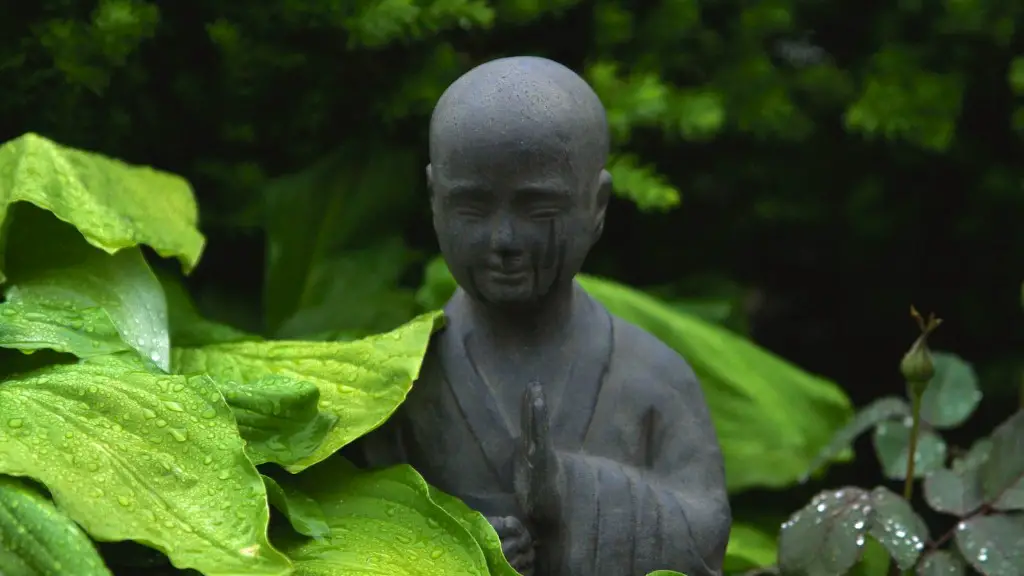Buddhism is often associated with happiness and peace of mind. But what does it really mean to be happy according to Buddhism? The first step is to understand the causes of happiness and suffering. Suffering comes from our impure thoughts and actions, while happiness comes from pure thoughts and actions. So if we want to be happy, we need to purify our thoughts and actions. We can do this by following the Noble Eightfold Path, which includes things like right speech, right action, and right mindfulness.
In order to be happy, Buddhism teaches that we must let go of our attachment to material things and focus on our spiritual journey. We must also live in the present moment and be mindful of our thoughts and actions. By doing these things, we can find true happiness and peace.
What Buddha said about happiness?
The greatest source of true happiness is to cherish others, according to Buddha. When we sincerely care for others’ well-being and happiness, our hearts become warm, open and connected to others, and we ourselves feel a sense of genuine well-being. Caring for others is a selfless act that brings true joy and happiness.
It’s so easy to get caught up in craving and desire. We see something we want and we just have to have it. But as Gautama Buddha said, everything sooner or later must change. So nothing we desire is ever truly ours. This can lead to a lot of unhappiness.
It’s important to remember that nothing in this world is permanent. Even if we have something we really want, it won’t last forever. So we should enjoy it while we can, but not become too attached to it. That way, we can avoid a lot of suffering.
What are the four pillars of happiness Buddhism
The Four Noble Truths are the foundation of Buddhist teaching. They are: the truth of suffering, the truth of the origin of suffering, the truth of the cessation of suffering, and the truth of the path to the cessation of suffering.
Buddhists believe that desire and ignorance are the root of suffering. By desire, they refer to craving pleasure, material goods, and immortality. All of these are wants that can never be satisfied, and so desiring them can only lead to suffering.
What are the 7 keys to happiness?
1. Be grateful for what you have. This is the foundation for happiness and success.
2. Be present in the moment. The past is gone and the future is not yet here.
3. Manage your time effectively. Set goals and priorities.
4. Set SMARTER goals. Specific, Measurable, Achievable, Realistic, and Timely.
5. Embody an empowering morning routine. Start your day off right!
6. Tackle the Most Important Things first. The things that will make the biggest impact.
7. Focus on health and wellbeing. Your success depends on your health!
Happiness is a state of mind that is often hard to define and even harder to achieve. However, scientists have found that there are three key factors that contribute to happiness: pleasure, engagement, and meaning.
Pleasure comes from doing things that you enjoy. This could be anything from your favorite hobby to simply taking a relaxing bath. It is important to find things that make you happy and make time for them in your life.
Engagement refers to feeling interested in your activities and connected to others. This could mean having a close-knit group of friends, being involved in a hobby or activity that you are passionate about, or simply enjoying your work. When you feel engaged with what you are doing, you are more likely to be happy.
Meaning comes from feeling like what you do matters. This could be volunteering your time to help others, working towards a goal that is important to you, or simply doing something that makes you feel good. When you feel like your life has purpose and meaning, you are more likely to be happy.
The three keys to happiness are pleasure, engagement, and meaning. By finding things that make you happy and doing them regularly, you can increase your overall happiness.
What is the biggest sin in Buddhism?
Ānantarya karma, or Ānantarika kamma, are the most serious offences in Buddhism. They are crimes that, through the overwhelming karmic strength of any single one of them, bring immediate disaster. Both Buddhists and non-Buddhists must avoid them at all costs.
Buddhist mindfulness meditation is a form of mindfulness meditation that is derived from the Buddhist philosophies and teachings. This type of meditation is based on the belief that the present moment is all that we have, and that by living in the present moment, we can be free from the suffering that is caused by our attachment to the past and future.
When we practise Buddhist mindfulness meditation, we focus on our breath and on the present moment. We become aware of our thoughts and feelings, but we do not judge them or try to change them. We simply observe them and let them go. This can be a very powerful practise for those who suffer from depression and anxiety, as it can help us to learn to let go of our negative thoughts and focus on the present moment.
What do Buddhists say about boredom
Boredom arises from the habit of the mind to label experience as either pleasant, unpleasant, or neutral. This is referred to in Buddhism as ‘vedana’ or feeling tone. Boredom arises when we are in a situation where the most obvious feeling tone is neutral.
Happiness is a complex emotion that can be difficult to define. However, some psychologists have suggested that it consists of three distinct elements: the pleasant life, the good life, and the meaningful life. The pleasant life refers to the experience of positive emotions and pleasurable experiences. The good life refers to a life that is satisfying and fulfilling, with a sense of purpose and direction. The meaningful life refers to a life that is significant and Contributing to something larger than oneself.
What are the 12 steps to happiness?
Happiness is a state of mind that can be achieved by anyone, regardless of their circumstances. There are many paths to happiness, but some common ones are doing things you enjoy, spending time with loved ones, forgivenes, and having a optimistic outlook on life. While it is important to be aware of the happiness of those around you, it is equally important to focus on your own happiness and not compare your own happiness to that of others. There are many ways to cope with unhappy thoughts and feelings, and finding what works best for you is an important step in achieving happiness.
I read this great advice somewhere and I wanted to share it with you. I hope you find it as invaluable as I have.
Live in the moment. It’s better to be loving than to be right. Be a spectator to your own thoughts, especially when you become emotional. Be grateful for at least one thing every day. Help others every chance you get.
What is the root cause of unhappiness
The Dalai Lama argues that the root cause of human unhappiness lies in misunderstanding. Many people do not really understand where their emotions, both positive and negative, come from. The solution, according to the Dalai Lama, is to educate yourself about your emotions and the circumstances that give rise to them.
These ten unwholesome actions are considered to be negative because they cause harm to either ourselves or others. By engaging in these activities, we create suffering for ourselves and others.
What are the three most negative actions a Buddhist can take?
The teaching about actions and results is the Buddhist moral law of Kamma-Vipaka. It states that there are three types of actions that can cause results: harming living beings, stealing, and misuse of the senses.
The golden rule of happiness is that the more you make others happy, the happier you will be. This is because when you make others happy, you are actually making yourself happy. This is because you are doing something good for someone else, and that makes you feel good.
Conclusion
There is no easy answer to the question of how to be happy, as the path to happiness is different for everyone. However, Buddhism does offer some basic teachings on how to find happiness and lead a more satisfying life.
According to Buddhism, the key to happiness lies in our own state of mind. If we can train our mind to be more positive and peaceful, we will naturally start to feel happier. This inner transformation can be achieved through the practice of meditation and mindfulness.
By regularly meditating and paying attention to our thoughts and emotions, we can gradually develop a more positive outlook on life. We can learn to let go of the negativity and stress that weigh us down, and instead focus on the present moment and the good that is all around us.
When we live in this way, with awareness and kindness, we naturally start to feel happier. We become more patient, more forgiving, and more compassionate. We see the beauty in life, even in the midst of difficulties, and we are able to find contentment and joy.
In order to be happy according to Buddhism, one must let go of attachment to things that are fleeting and instead focus on what is ultimately important: following the path to enlightenment. This means living in the present moment and being aware of one’s thoughts, feelings, and actions. Once you let go of attachment to things that don’t truly matter, you open yourself up to lasting happiness.


